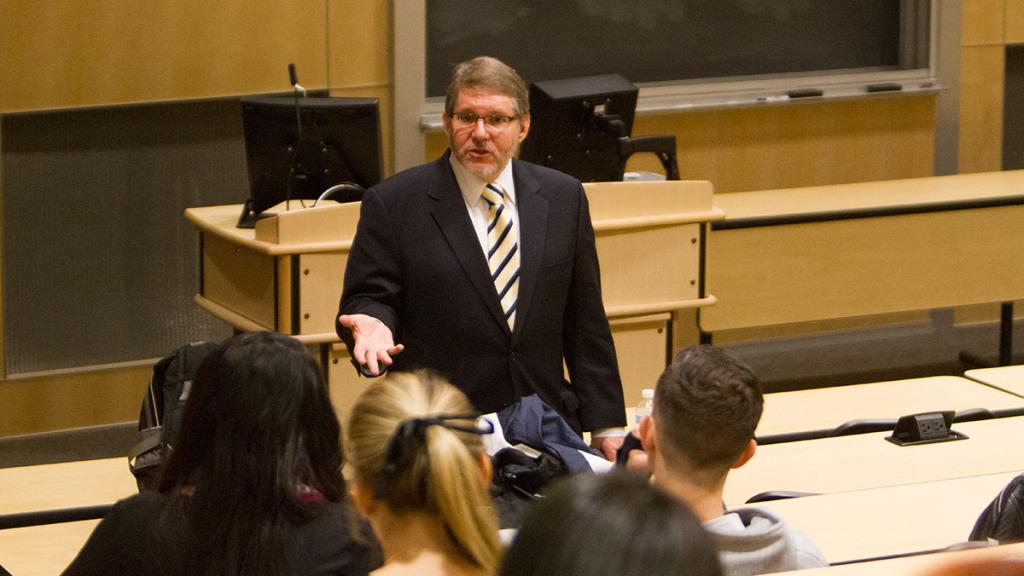Following the visit of the first candidate for the permanent position of provost and vice president for education affairs at Ithaca College earlier in the week, the campus hosted another candidate for the position on Dec. 4.
Benjamin Rifkin, dean of the school of humanities and social sciences and professor of Russian at The College of New Jersey, is one of four candidates to replace Marisa Kelly, former provost and vice president for educational affairs, who left the college on May 31. Rifkin met with members of the campus community throughout the day, and presented at an open meeting in Emerson Suites.
Rifkin began his presentation by acknowledging the Dec. 3 verdict by a grand jury not to indict New York police officer Daniel Pantaleo for the death of Eric Garner. During Rifkin’s presentation, over 300 students participated in a die-in at three locations around campus, including outside of Emerson Suites, to protest problems of structural violence and racial injustice. Rifkin said he was aware of the demonstration and commended students for making their voices heard.
“Not to say that I like what has happened,” Rifkin said of Garner’s death, “but this is the kind of crisis that’s really good for a learning experience for a campus community.”
Rifkin went on to discuss his goals for the college were he to be the next provost and vice president for educational affairs.
Integration of student affairs and academic affairs
Rifkin said his top priority as provost would be to continue the integration of academic affairs and student affairs.
“The reason that I applied for this position was that when I saw in the position announcement that the primary focus of this position is to help integrate the divisions in academic and student affairs, my heart skipped a beat, because this is what I’m all about,” Rifkin said. “This really is something that floats my boat.”
He said an institution in which academic and student affairs work collaboratively can improve the college experience for students by providing new avenues of learning that give students a more holistic education overall.
Rifkin also said he would want to increase the collaboration between different groups on campus, giving an example in which students in the business school aid student organizations with their finances and become involved in different areas on campus in that way.
Learning beyond the classroom
Rifkin said he would emphasize providing what he called significant learning opportunities for students. He gave the examples of internships, undergraduate research and in particular, study abroad, which Rifkin said opens doors for participants.
“I think it’s really important for college students to have that experience away and then to come back and reflect on it meaningfully with classmates and faculty,” he said.
Moving away from a past educational system that focused on the accumulation of general knowledge, to one that emphasizes collaboration with different types of people in different types of environments, is essential for students to have a successful college experience, Rifkin said.
“These are the things that have been shown to increase retention rates and completion rates and have a powerful transformative impact on students’ learning while in college,” he said.
Strategic changes
While Rifkin praised the college for its plan to integrate different aspects of campus, he said the implementation of such initiatives has to be handled with care. Rifkin, who studies Russia, cited radical structural change brought about through the Russian Revolution and how it was responsible for numerous atrocities committed against the Russian people in subsequent years.
“Now, I don’t want to suggest that imposing things from above at Ithaca College is going to have that kind of impact, but I do believe in evolutionary change and working with partners collaboratively to figure out the best approach to solve problems … I recognize that Rome will not be built in a day,” he said.
Rifkin said the college needs to be strategic in the way it changes structures on campus so as to ensure the changes implemented are successful and long-lasting.








